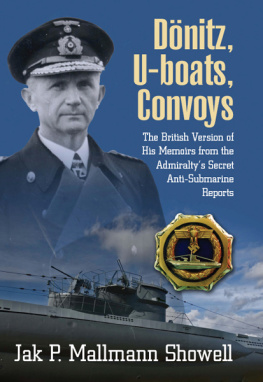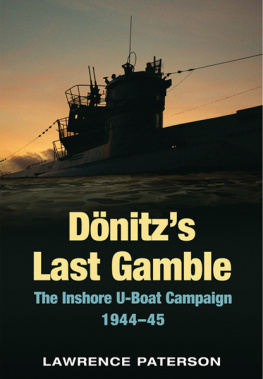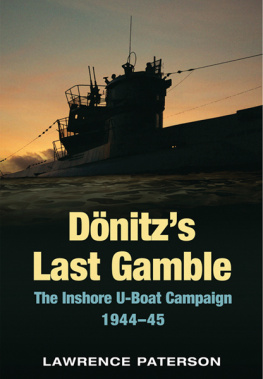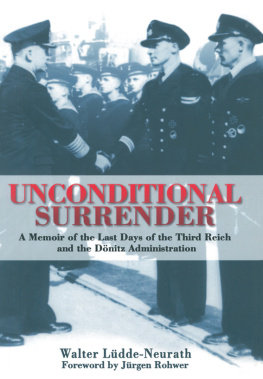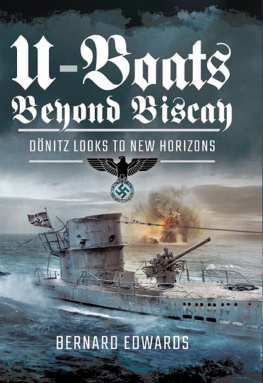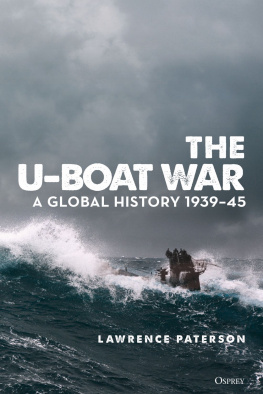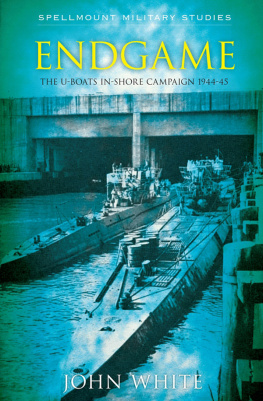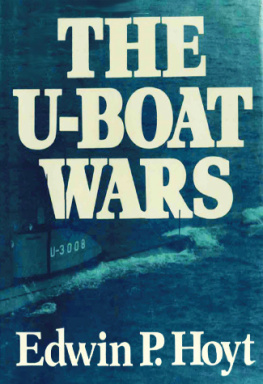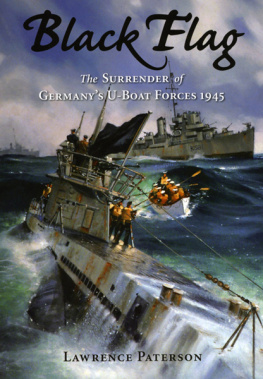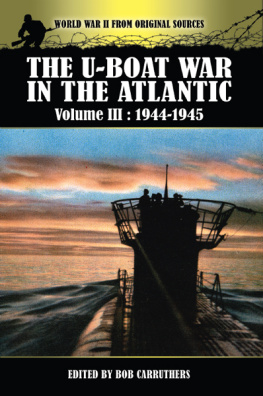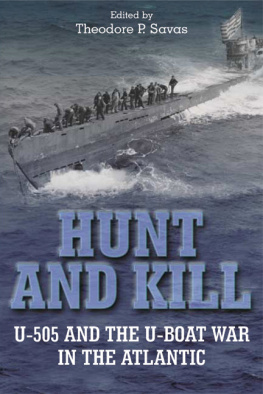
DNITZ, U-BOATS, CONVOYS
The British Version of His Memoirs from the
Admiraltys Secret Anti-Submarine Reports
This edition published in 2013 by Frontline Books,
an imprint of Pen & Sword Books Ltd,
47 Church Street, Barnsley, S. Yorkshire, S70 2AS
www.frontline-books.com
Copyright Jak P. Mallmann Showell, 2013
Text from the Monthly Anti-Submarine Reports Crown Copyright with kind
permission of the British National Archives (Kew, London)
The right of Jak P. Mallmann Showell to be identified as the author of this work has been
asserted by him in accordance with the Copyright, Designs and Patents Act 1988.
HARDBACK ISBN: 978-1-84832-701-6
PDF ISBN: 978-1-47383-086-8
EPUB ISBN: 978-1-47382-970-1
PRC ISBN: 978-1-47383-028-8
All rights reserved. No part of this publication may be reproduced, stored in or introduced
into a retrieval system, or transmitted, in any form, or by any means (electronic,
mechanical, photocopying, recording or otherwise) without the prior written permission
of the publisher. Any person who does any unauthorized act in relation to this publication
may be liable to criminal prosecution and civil claims for damages.
CIP data records for this title are available from the British Library
For more information on our books, please visit
or write to us at the above address.
Printed and bound by CPI Group (UK) Ltd, Croydon, CR0 4YY
Typeset in 11/13 Celeste by M.A.T.S. Typesetters, Leigh-on-Sea, Essex
Contents
List of Plates
Introduction
Karl Dnitz
16 September 1891 24 December 1980
Karl Dnitz (U-boat Chief, Supreme Commander-in-Chief of the German Navy and finally Hitlers successor) must rank as one of the most misunderstood leaders of the Second World War. There has been a widespread tendency to over-estimate his pre-war powers and, after he had been promoted to Supreme Commander-in-Chief of the Navy, to reproach him for not having acted like a rebellious junior officer. At the start of the war, he was at the bottom of a long command chain and in what many people considered to have been an undesirable and unimportant post. As Flag Officer for U-boats (Fhrer der Unterseeboote), he held the position of Captain and Commodore and was responsible for running a small operational control department. This carried approximately the same authority as a cruiser captain. The real power in submarine command was wielded by the U-boat Division of the Supreme Naval Command in Berlin, with which Dnitz had virtually no contact. The U-boat Division did not seek his opinions and Dnitz did not influence submarine development, construction programmes, training schedules or naval policies. His isolation can be illustrated by the position of the submarine training flotilla, which came under the jurisdiction of the Torpedo Inspectorate and not under the Flag Officer for U-boats. This state of affairs did not change until after the start of the war.
Dnitzs promotion on 30 January 1943 to Supreme Commander-in-Chief of the Navy was most extraordinary. Grand Admiral Erich Raeder was 67 years old when he resigned, after having served as Chief of the Navy for just over 14 years. Both his immediate predecessors (Paul Behnke appointed in 1920 and Hans Zenker appointed in 1924) were 54 years old when they took command and remained in the post for four years. In view of Raeders age and length of service, one might have thought that the Naval Command (or Admiralty) would have had several deputies in the running for this high office. Yet no one was ready to step into Raeders shoes. He nominated the 58-year-old Admiral Rolf Carls (Commander-in-Chief of the Naval Group Command North) as his most suitable successor, but also suggested Dnitz to Hitler if the Fhrer wanted to emphasise the importance of the U-boat war.
Dnitzs appointment was a great personal triumph and a terrific boost to the sagging morale of the U-boat arm, but there were some distinct disadvantages. Dnitz, who had never been trained as a staff officer, was not familiar with the delicate intricacies of the Naval High Command and, in addition, had been incarcerated within the narrow confines of the U-boat operations headquarters for eight years. For the last two he had been in France, a long way from the general naval hubbub, and furthermore he had several major disagreements with the departments he was now to command. To make matters worse, he took over from Raeder at a most difficult stage of the war. All fronts were falling: the battle in the Atlantic had been lost; the Battle of Stalingrad had ended in disaster; the North African campaign was in full retreat and the naval leadership had no alternative other than to become fully involved in political struggles. Despite this, he was one of the few officers who openly opposed Hitler and often put forward alternative proposals when he did not agree with the Fhrers directions. On several occasions he even refused to carry out Hitlers orders.
Dnitz was also more than democratic when dealing with the men under him. Commanders and men were allowed to leave their U-boats, without having to give reasons, as soon as replacements were found and more than one commander was relieved of his position because the lower ranks objected to his presence. In May 1943, when the more than forty U-boats were sunk, Dnitz went as far as instructing flotilla commanders to hold a secret ballot among crews. Everybody, including the lowest ranks, should vote whether to give up or continue with the struggle. It was the overwhelming support to continue going to sea that induced him to re-group what remained and to have another fling against powerful opponents.
At the time when Dnitz wrote his memoirs, it was exceedingly difficult to find information about the war at sea. Many German naval records and log-books were captured at the end of the war and immediately classified as top secret by the victorious Allied powers. This ruling was so tight that neither Dnitz, Raeder nor their defence lawyers were allowed access to these vital documents after the start of the Nuremberg Trials. A few senior officers were allowed to view the logs for a period of a few days before the trials started but without knowing the charges which were likely to be made. This cloak of tight secrecy remained until the early 1990s, when the British Admiralty finally returned captured documents to Germany. By that time, American authorities were already more open to scrutiny and the US National Archives had made a good number of German logbooks available on 35mm microfilm. The absurdity of the Admiraltys dogged tightness can be further illustrated by the fact that copies of a number of the logs in their possession could be viewed in the United States and in German libraries while those in London were still closed to the public.
During the war about half-a-dozen or so copies were made of each log for distribution to a variety of departments and this duplication assured that one set of the U-boat Commands war diary remained in Germany, to be used by Dnitz as source for Ten Years and Twenty Days. Very few other authors of the period would have access to such valuable records.
Ten Years and Twenty Days was one of the first U-boat books to be published after the war and was written at a time when it was virtually impossible for the average person to find out even the most basic information about U-boats; who commanded which boat, what type any U-boat might have belonged to or any other relevant information. This led to numerous inaccuracies in many books because the majority of historians often had to make calculated guesses as to which piece of highly contradictory information might be correct.
Dnitz had one more significant advantage over other authors of the period. That came in the form of help from his son-in-law, the ex-U-boat commander and staff officer Gnter Hessler. Immediately after the end of the war, the Royal Navy commissioned him to write a German account of the U-boat war and this was printed for limited circulation, but remained so highly classified that the majority of historians didnt even know of its existence. This was not released until 1989, when Her Majestys Stationery Office published all three volumes as one book. Hessler did have some limited access to German papers, but it is unlikely that he saw Allied classified documents. Yet the writing of this account must have generated a considerable volume of useful information for his father-in-law. Illegal carbon copies of this typescript and some of the original Indian ink diagrams were passed on by Hessler, although it is now too difficult to trace the history of this material or determine how much of this had been available for the writing of Dnitzs book.
Next page
